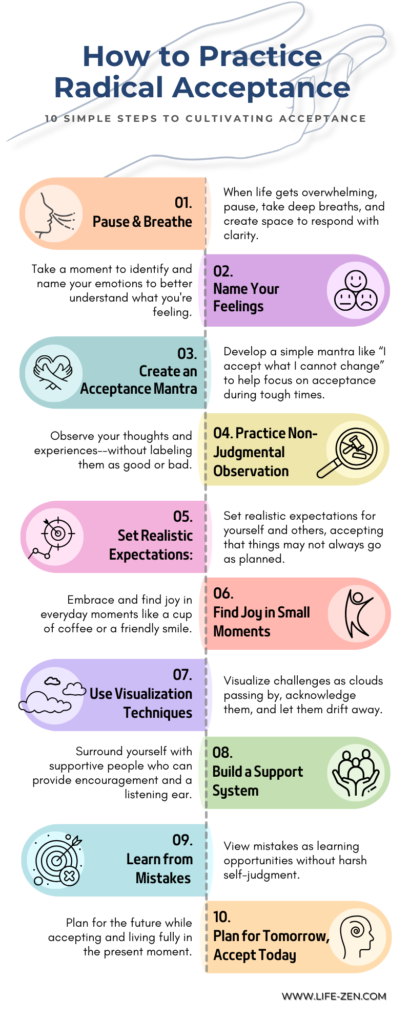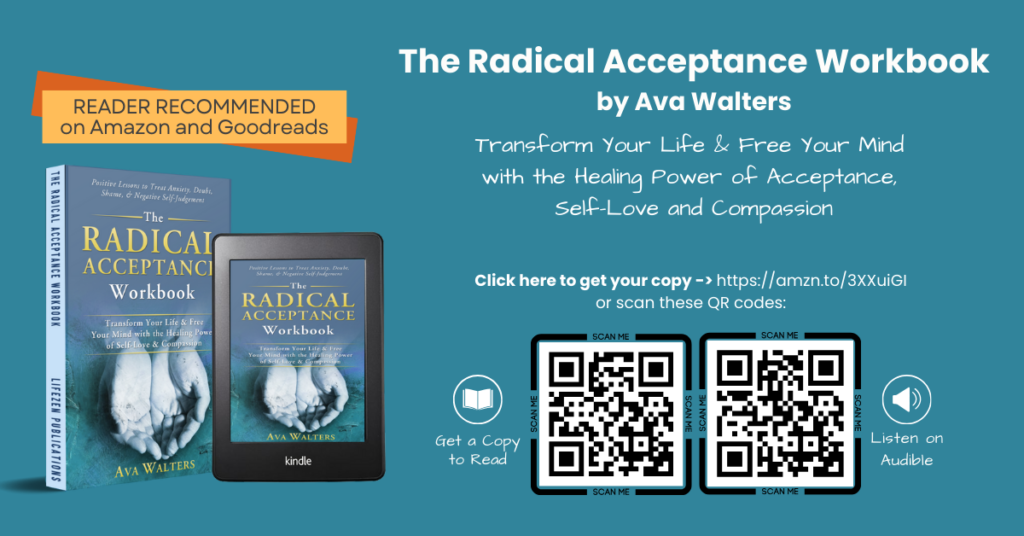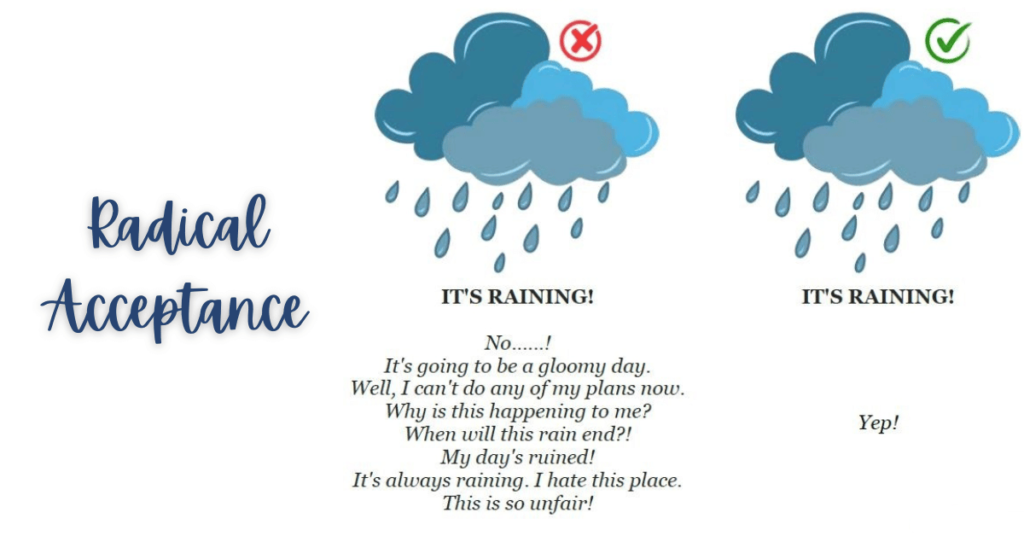Radical Acceptance is about accepting reality AS IS—without resistance or judgment. It means fully acknowledging and accepting your current situation even when you’re unhappy or uncomfortable with it. It’s a life philosophy that aims to reduce suffering by embracing life’s challenges without trying to change or deny them.
As we go through life, we often face unexpected obstacles, hardships, and uncomfortable situations. However, rather than accept these sensations as a natural part of being human, we frequently deny, ignore, or wish for a different reality. It is in moments when we are in denial and unwilling to accept that we create our own suffering. Here’s how you can start embracing radical acceptance to lead a more fulfilling life.
What Does Radical Acceptance Look Like?
Imagine you’re stuck in traffic, late for an important meeting. Your initial reaction might be frustration, stress, or anger. Radical Acceptance encourages you to step back, take a deep breath, and accept the fact that you’re stuck in traffic. That’s it.
Instead of dwelling on what could have been or what should be, you simply embrace the reality of the situation. Now, why would you want to do this? Well, consider the alternative.
If you don’t accept that you’re stuck in traffic, you’re “marinating” in your unpleasant situation. The longer you stay in that frame of mind–I’m stuck in traffic! I’m stuck in traffic!!! –the more you’ll get annoyed!
So, imagine what will happen if you’re going through a particularly difficult situation in life (e.g., a breakup, financial problems, the unexpected death of a loved one, etc.). The pain you feel from these events will likely turn to suffering IF you don’t accept the reality of the situation. The longer you deny difficult emotions and unpleasant situations, the harder it is for you to overcome them.
So, Radical Acceptance, in its simplest meaning, is REALITY ACCEPTANCE.
Where Did Radical Acceptance Come From?
Radical Acceptance has deep roots in Dialectical Behavior Therapy (DBT), which psychologist Marsha M. Linehan developed.1 DBT is a therapeutic approach that combines cognitive-behavioral techniques with mindfulness practices. Studies show that Radical Acceptance is particularly effective in managing emotions and reducing distress.2,3
When I was completing my DBT skills certification, I was intrigued to learn how Dr. Linehan made Radical Acceptance a key component of her therapy. She said that during therapy sessions, clients found it difficult to make changes in their lives because they were not fully understanding–and accepting–their current situation. It made perfect sense to me!
For example, when I was experiencing burnout a few years ago, I don’t think I could have effectively healed had I not radically accepted the deeper reasons for my burnout. It’s a long story, but they primarily stemmed from the emotional neglect I experienced in childhood.
At first glance, it looked like they (childhood emotional neglect and burnout) were not related at all. However, as I dug deeper and accepted the reality of my childhood experiences, only then was I able to understand my burnout and make the life changes I needed to heal.
- It’s NOT about being all “I don’t care” or “whatever” about something. Acting like you don’t care is often a way to hide deep pain. Radical Acceptance is the opposite. It’s about fully accepting the problem and the hurt, not because you want to be hurt but because you want to heal from it.
- And one last thing: it’s NOT about other people. Your reality is yours alone. You can’t accept things for others; you can only do it for yourself.
So, Radical Acceptance is about looking at your current reality and figuring out how to move forward without getting stuck in the past or freaking out about what’s next. It’s about you, who or what’s preventing your happiness, and finding a way to make things better.
Why is Radical Acceptance so Hard?
Many people find Radical Acceptance hard to embrace because of all the misconceptions surrounding it! So, let’s clarify a few of them.
- First off, Radical Acceptance is NOT about saying “yes” or “okay” to anything. You’re not agreeing or approving. It’s more like recognizing that something is happening or has happened.
- Also, it’s NOT about pretending, denying, or avoiding reality. It’s about facing the truth, even if it’s not great. You’re not dodging tough situations or bad feelings; you’re just acknowledging their presence so you can figure out how to deal with them.
- And it’s definitely NOT about giving up. Accepting a situation doesn’t mean you’re okay with it staying the same. It’s not a free pass. It’s about facing the truth, including all the emotions that come with it.
- Radical Acceptance is also NOT about doing nothing. When tough stuff happens, you don’t say, “Oh well, I guess this is fine.” You recognize what happened so you can figure out what to do next.
- And here’s a big one: radical acceptance is NOT about hiding your feelings. It’s about letting all your feelings exist, whether they’re happy or painful. There is no ignoring or pretending here.
- This philosophy is also NOT about downplaying things. It’s not saying, “Oh, it’s not a big deal.” It’s about really understanding how tough things are and how they make you feel.
- Oh, and it’s definitely NOT about dwelling on the past or freaking out about the future. It’s about being in the “NOW.” You’re not stuck in yesterday’s regrets or tomorrow’s fears.
How Do I Practice Radical Acceptance?
The following is what this life philosophy looks like:
- Acknowledge Your Reality AS IS. Recognize your current situation. This means being honest with yourself about what is happening, even if it’s uncomfortable or unpleasant. Important: when you acknowledge reality, stick to facts. Don’t guess or make assumptions, especially about other people’s intentions.
- Let Go of Judgments. Radical Acceptance requires letting go of your opinions or judgments about a situation. So, instead of labeling something (or someone) as good or bad or right or wrong, you simply observe it without attaching value judgments.
- Surrender to the Present Moment. Surrendering, in this sense, doesn’t mean giving up or being defeated. It means letting go of your resistance to the present moment and allowing yourself to experience it fully. This surrender can be liberating and empowering.
- Stop the “Shoulds” and “Musts.” Often, emotional suffering comes from the gap between reality and our expectations. Radical Acceptance encourages you to release your “shoulds” and “musts” – the rigid ideas you may have about how people, things, and events should be – and simply accept things as they are.
Once, I was asked, “What if I don’t mean it?” If you’re thinking this, I believe you’re still a bit confused about Radical Acceptance. Remember, the concept doesn’t imply any form of agreement or condonment on your part. It’s just an acknowledgment of reality (what’s happening or what has happened).
For example, suppose there’s a big box blocking your way. In this situation, Radical Acceptance means…
Acknowledgment of Reality -> There’s a box blocking your way.
Letting Go of Judgments -> Don’t think about who put the box there or why it’s there; just accept that there’s a box there.
Surrendering to the Present Moment -> A box is blocking you, and you’re what? Annoyed? Frustrated? That’s perfectly fine! There’s no need to deny the impact the box has on you. But you do have to accept your feelings about it as easily as you accept the presence of the box in front of you.
Stopping the “Shoulds” and “Musts” -> Step away from thoughts such as “This shouldn’t be here!” or “The person who put this here is so inconsiderate!” Just accept… you guessed it, there’s a box blocking your way.
How Do I Apply Radical Acceptance in My Daily Life?
Implementing Radical Acceptance in your daily life is like giving yourself a gift – the gift of peace amidst the chaos. By incorporating the following tips, you’re building a toolkit for navigating life’s challenges with grace and resilience.
- Pause and Breathe.
- When life throws you a curveball, take a moment to pause. Breathe in, breathe out. This simple act of pausing and focusing on your breath can create a space between you and the chaos, allowing you to respond with more clarity.
- Name Your Feelings:
- Sometimes, we feel a jumble of emotions without really understanding what’s going on. Take a moment to name your feelings. Are you feeling frustrated, sad, or maybe even a little happy? Naming your emotions can help you make sense of them.
- Create an “Acceptance Mantra”:
- Develop a mantra that reinforces the idea of accepting the present moment. It could be something like “This is how it is right now” or “I accept what I cannot change.” Repeat this mantra when things get tough to bring your focus back to acceptance.
- Practice Non-Judgmental Observation:
- Throughout the day, practice observing your thoughts and experiences without judgment. Instead of saying, “This is good” or “This is bad,” simply notice what is happening without attaching labels.
- Set Realistic Expectations:
- Often, we set ourselves up for disappointment by having unrealistic expectations. Radical Acceptance encourages setting realistic expectations for yourself and others. Understand that things might not always go as planned, and that’s okay.
- Find Joy in Small Moments:
- Life is a series of small moments. Embrace them! Find joy in a cup of coffee, a friendly smile, or the warmth of sunlight. Radical Acceptance is also about appreciating the simple pleasures that surround you.
- Use Visualization Techniques:
- When faced with a challenging situation, visualize it as a cloud passing through the sky. See it there, acknowledge it, and then let it drift away. This visualization can help you detach from the intensity of the moment.
- Build a Support System:
- Surround yourself with people who understand and support your journey of Radical Acceptance. Share your experiences with friends or family members who can provide encouragement and a listening ear.
- Learn from Mistakes Without Self-Judgment:
- Mistakes happen—they’re a part of being human. Instead of beating yourself up, view mistakes as opportunities for growth. Learn from them without attaching harsh judgments to yourself.
- Plan for Tomorrow, Accept Today:
- It’s natural to plan for the future, but don’t let it overshadow the present. Plan for tomorrow while accepting and living in today. Be mindful of the present moment and the experiences it brings.

What are the Benefits of Radical Acceptance?
If you think about it, what’s the alternative of acceptance? Usually, it’s denial or avoidance. That’s like trapping yourself in a state of resistance, isn’t it? In contrast, if you radically accept, then you can benefit from the following:
- Reduced Stress: By accepting the reality of a situation, you eliminate your internal struggle against it. This reduction in inner conflict can significantly decrease stress and anxiety. Powerful, right?
- Improved Emotional Regulation: When you stop resisting and judging your emotions, you gain better control over them. Radical Acceptance is a powerful tool for emotional regulation, helping you navigate through difficult feelings with more ease.
- Enhanced Relationships: Accepting others as they are, without trying to change them, fosters healthier relationships. Radical Acceptance extends beyond self-acceptance to accepting the people in your life with all their imperfections.
- Increased Resilience: Life is full of uncertainties and challenges. Radical Acceptance builds resilience by teaching you to adapt and respond to situations with a clear and open mind.
Radical Acceptance is a powerful philosophy that can transform the way you navigate life’s challenges. Personally, I find it to be a very “freeing” concept. I save myself from constant “what ifs” (and plenty of shoulds and musts)! In doing so, I quickly move forward to solutions and make myself feel better.

Frequently Asked Questions (FAQ)
Resources
- Linehan, M. M. (2015). DBT Skills Training Manual. Guilford. ↩︎
- Segal, O., Sher, H., Aderka, I. M., & Weinbach, N. (2023). Does acceptance lead to change? training in radical acceptance improves implementation of cognitive reappraisal. Behaviour Research and Therapy, 164, 104303. https://doi.org/10.1016/j.brat.2023.104303 ↩︎
- Taitz, J. (2021, April 22). Radical acceptance can keep emotional pain from turning into suffering. The New York Times. https://www.nytimes.com/2021/04/22/well/mind/radical-acceptance-suffering.html ↩︎


Pingback: What is Mindfulness? - LifeZen Publications